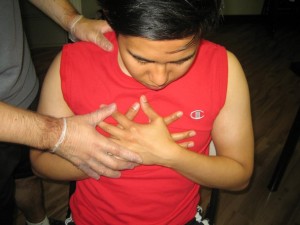Fact Checked
Heart Attack Symptoms – How To Identify Them?
- The most frequent symptom of a heart attack is chest pain.
- Though many people suffer from pain that is severe, some might only have mild to modest symptoms.
- A heart attack can be any disturbing pain that occurs for more than 10 minutes.
The most frequent symptom of a heart attack is chest pain. Though many people suffer from pain that is severe, some might only have mild to modest symptoms. - Heart attack pain can also branch out into the shoulder and arm.
- Someone experiencing a heart attack might have chilly and damp skin.
- Lightheadedness, nausea, shock and sickness are also general signs.
- A casualty experiencing chest pain and any other symptoms should always be seen to by a medic. You should also offer them one aspirin to take. This helps to thin the blood and prevents clotting.
Cardiac Arrest – How To Respond
- Cardiac arrest takes place when the heart abruptly stops. Most of the time, this causes the casualty to instantly become unconscious. When this occurs, phone for an ambulance straight away.
- The quicker a medic can get to the casualty, the better their chances will be. You can then carry on with CPR according to the directions of the emergency dispatcher. Though, if you are with somebody who can phone for an ambulance, you should continue with CPR yourself.
- Put the casualty flat on their back, and interconnect your hands on the chest. You then have to quickly do 30 chest compressions.
- As you provide the casualty with the rescue breath, lean the head back and puff in through their mouth.
- Carry on with this process until the casualty recovers and gains consciousness or the ambulance arrives.
Responding To Other Heart And Chest Emergencies
- Even though heart attacks and cardiac arrests are some of the most frequent cardiac emergencies, there are others that can be fatal too.
- If you are with a person who has chest pain that deteriorates when breathing in, then they could be experiencing a pulmonary embolism. A Pulmonary embolism is severe and the casualty needs medical assistance.
- Intense chest pain that shift from the heart to the shoulder might be signs of an aortic dissection.
- Chest pain that is mild and incessant for more than half an hour can signify uncontrollable angina, which occasionally transpires before a heart attack.
